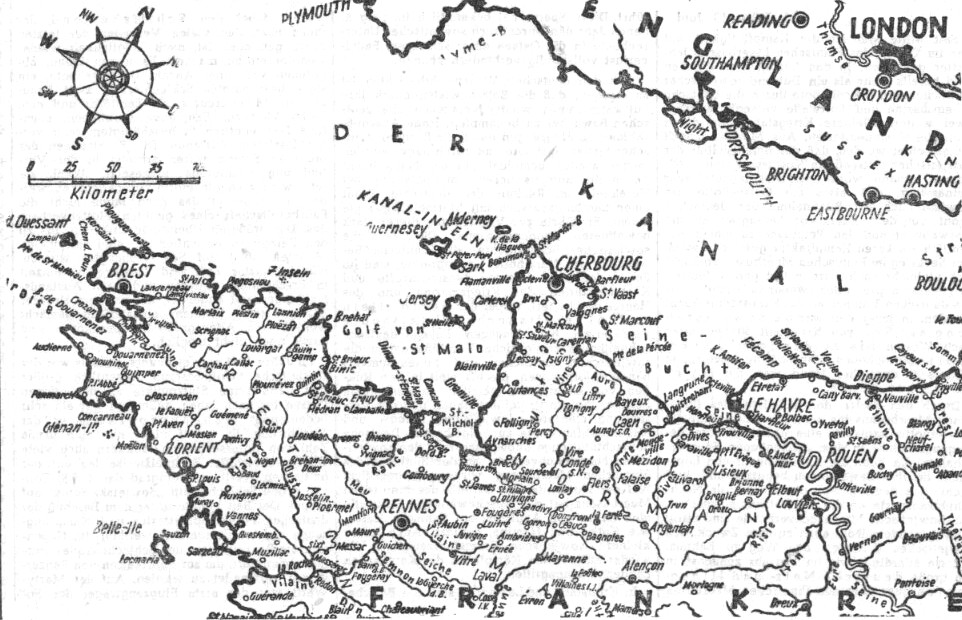The Pittsburgh Press (June 13, 1944)

Roving Reporter
By Ernie Pyle
Normandy beachhead, France –
On our first morning after leaving London, the Army gave us assault correspondents a semi-final set of instructions and sent us off in jeeps in separate groups, each group to be divided up later until we were all separated.
We still weren’t given any details of the coming invasion. We still didn’t know where we were to go aboard ship, or what units we would be with.
As each batch left, the oldsters among us would shake hands. And because we weren’t feeling very brilliant, almost our only words to each other were, “Take it easy.”
The following morning, at another camp, I was called at 4:00 a.m. All around me officers were cussing and getting up. This was the headquarters of a certain outfit, and they were moving out in a motor convoy at dawn.
For months, these officers had been living a civilized existence, with good beds, good food, dress-up uniforms, polished desks and a normal social existence. But now once again they were in battle clothes. They wore steel helmets and combat boots, and many carried packs on their backs.
They joked in the sleepy pre-dawn darkness. One said to another, “What are you dressed up for, a masquerade?”
Everybody was overloaded with gear. One officer said:
The Germans will have to come to us. We can never get to them with all this load.
The most-repeated question, asking jokingly, said, “Is your trip necessary?”
These men had spent months helping to plan this gigantic invasion. They were relieved to finish the weary routine of paperwork at last, and glad to start pulling their plans into action. If they had any personal concern about themselves, they didn’t show it.
I rode with the convoy commander, who was an old friend. We were in an open jeep. It was just starting to get daylight when we pulled out. And just as we left, it began raining – that dismal, cold, cruel rain that England is so capable of. It rained like that a year and a half ago when we left for Africa.
We drove all day. Motorcycles nursed each of our three sections along. We would hail every two hours for a stretch. At noon, we opened K rations. It was bitter cold.
Enlisted men had brought along a wire-haired terrier which belonged to one of the sergeants. We couldn’t have an invasion without a few dogs along. At the rest halts, the terrier would get out in the fields to play and chase rocks with never any worry. It seemed wonderful to be a dog.
The English roads had been almost wholly cleared of normal traffic. British civil and army police were at every crossing. As we neared the embarkation point, people along the roads stood at their doors and windows and smiled bon voyage to us. Happy children gave us the American OK sign – thumb and forefinger in a circle. One boy smilingly pointed a stick at us like a gun, and one of the soldiers pointed his rifle back and asked us with a grin: “Shall I let him have it?”
One little girl, thinking the Lord knows what, made a nasty face at us.
Along toward evening we reached our ship. It was an LST, and it was already nearly loaded with trucks and armored cars and soldiers. Its ramp was down in the water, several yards from shore, and being an old campaigner, I just waded aboard. But the officers behind me yelled up at the deck: “Hey, tell the captain to move the ship up closer.”
So, they waited a few minutes, and the ramp was eased up onto dry ground, and our whole convoy walked around. Being an old campaigner, I was the only one in the crowd to get his feet wet.
We had hardly got aboard when the lines were cast off and we pulled out. That evening the colonel commanding the troops on our ship gave me the whole invasion plan in detail – the secret the whole world had waited years to hear, and once you have heard it you become permanently a part of it. Now you were committed. It was too late to back out now, even if your heart failed you.
I asked a good many questions, and I realized my voice was shaking when I spoke but I couldn’t help it. Yes, it would be tough, the colonel admitted. Our own part would be precarious. He hoped to go in with as few casualties as possible, but there would be casualties.
From a vague anticipatory dread, the invasion now turned into a horrible reality for me.
In a matter of hours, this holocaust of our own planning would swirl over us. No man could guarantee his own fate. It was almost too much for me. A feeling of utter desperation obsessed me throughout the night. It was nearly 4:00 a.m. before I got to sleep and then it was a sleep harassed and torn by an awful knowledge.
